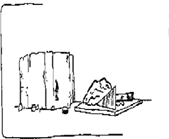10

I Seek Higher Things
"thou shalt not covet" Ex. 20:17
One
Two
Three
Four
Five
Six
Seven
Eight
Nine
Ten
If men and mankind were capable of keeping the tenth commandment there would be no more wars or fences, locks, or prisons. Nation would no longer rise up against nation. Our doors could be left unlocked when we left our homes, and we could be assured that nothing would have been molested stolen or disturbed when we came home. Likewise our positions would be as safe as our possessions and no one would be seeking to unseat us from our station, or undermine us on their way to the top. If man was capable of keeping this last commandment no man need fear for his life or for that of his loved ones. But, alas, this above all other commandants, proves that no man is without sin.
The Apostle Paul found it impossible for his conscience to "out run" this final command brought down from Mt. Sinai. While he could pretend to somehow achieve an acceptable standard of worship, and avoid violations of the other commandments such as stealing, and killing, he could not keep this law. While other commandments are committed "without" this one is committed "within." We need never lift a finger and take what does not belong to us, we may never trespass onto another's property and yet we can hardly get though the day without brushing up against this fragile commandment and doing it violence. When Paul said "I had not known sin except for this commandment" (Rom. 7:7) what he meant was that to sinful human nature covetousness comes naturally.
When we look at others we often compare and quickly calculate another's success, and if we are not careful, find ourselves sinning with a "sigh." We have to walk, but the rich man is carried by slaves on a liter. We eat gruel while another enjoys a banquet. All the while we are likely, if not careful, to pass judgment upon those who "have" just because we "have not."
A man would rather confess to breaking all the nine other commandments than to confess to breaking this one, especially when it ripens and turns green with envy. To admit to covetousness is to admit to a glaring weakness, lack, and deficiency in our own lives. To admit to covetousness is akin to pronouncing ourselves inferior to the person we envy.
Jesus dealt with the subtlety of this most secret sin, when he explained that hating a man enough to "kill" him was as good as doing so though not a single shot is fired. His commentary on those civil commandments should not have startled the disciples, for the spirit of such a sterling standard was found all along in the tenth commandment. Any honest penitent must realize that he has broken it a thousand times.
Covetousness is the dark shadow of an enthroned "self" who sits as the centerpiece of our sinful universe. Selfishness is an evil usurper of the throne that rightfully belongs to God. Self is a despot that has a lust for the things of the world that cannot ever be satisfied.
Covetousness simply means "desire." It is no sin in and of itself. The theological meaning is that of desiring what does not, or should not belong to us. Desire, like a fire, can be useful when it is controlled and made to serve good. But when desire or fire jumps from the fireplace the whole house can be burned to the ground. Uncontrolled desire has destroyed homes, health, body, mind and spirit.